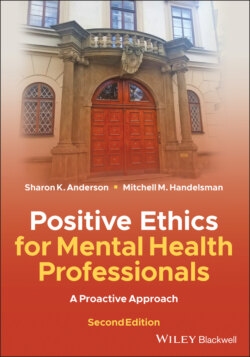Читать книгу Positive Ethics for Mental Health Professionals - Sharon K. Anderson - Страница 46
Journal Entry: Social Justice and My Core (My Needs, Motivations, and Values)
ОглавлениеThe list of social justice counseling roles by Sue and his colleagues may appear daunting to some and exciting to others. You may ask, “How do I perform several roles—such as therapist and advocate or change agent—with my clients and their world? How do these roles even fit together? How does being an advocate, a change agent, or psychoeducator relate to my needs, motivations, and values for being a psychotherapist?”
Take a moment to look back at the exercises in Chapter 1 where you identified or listed your needs and motivations for becoming a psychotherapist and important values for being a psychotherapist. As you review these lists, which needs, motivations, and values suggest a call to promoting or improving the welfare of humans? Which ones are more exclusively individual in nature? Which ones represent a mixed picture—addressing the call to help your individual clients in addition to the call to social justice? Hailes et al. (2020) provided guidelines and actionable items for implementing social justice counseling, and Sue et al. (2019) identified possible roles in social justice counseling/therapy. How do you see yourself as an advocate? consultant? psycho-educator? change agent? community worker? How might you fulfill some of these roles? Which of those struck a chord with your core? What does that say about what’s in your core and the foundation for your professional ethical identity?
